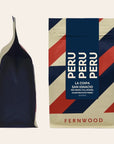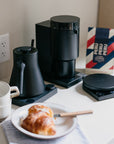Our Operations Manager, Eric, travelled to Peru as this year's origin trip. This is an excerpt from his journal:

Your cup of coffee doesn’t make sense. The scope is too massive to fully comprehend.
I’ve worked in coffee for over a decade, thought I understood the “seed to cup” story. I’d read the books, watched the videos, seen the competitions, and visited countless cafés and roasteries. But until Peru, my first trip to origin, I didn’t grasp the reality.
After two days of travel, I landed in Chiclayo, Northern Peru, our base camp for venturing into coffee country. From there, the days unfolded with equal parts awe and sobering clarity.
The Roads & the People
We drove precarious mountain roads that once only donkeys could traverse, now connecting villages sustained almost entirely by coffee. Festivals and ceremonies revealed just how deeply coffee is woven into daily life. Coffee isn’t a crop here; it’s identity, economy, and survival.

Café Femenino
Meeting the women behind Café Femenino was a highlight. I’ve seen their name stamped on burlap countless times, but to stand in their washing station and hear their stories was humbling. They spoke candidly about climate change shrinking bean size, the need for basic tools like hoses or plastic sheeting, and the balance between producing quality and ensuring a prosperous economy. Transparency and open communication between farmers, importers, and roasters aren’t luxuries; they’re necessities.


The Weight of Coffee
At the mills, I witnessed the staggering logistics: sacks of green coffee traced back to individual farms, moisture carefully controlled in chaff-fired drying drums, beans sorted by size, color, and finally by hand. Every bag that reaches us represents unimaginable distances, labor, and countless hands.


Hard Truths
Coffee is not just about taste. It’s about rural agriculture, backbreaking labor, and fragile communities facing climate uncertainty. It’s about relationships; listening to farmers as much as they listen to us. Paying more for coffee isn’t charity; it’s what sustains these villages and ensures quality. Certifications and labels help, but they’re just one piece of the puzzle. True progress comes from ethical buying practices, transparent dialogue, and a willingness to value people as much as product.
When I finally returned to Lima’s polished cafés, I knew I’d never look at a cup of coffee the same way again.
Takeaways from Peru:
-
A single cup of coffee requires vast distances, complex logistics, and countless contributors.
-
Relationships and transparency between farmers, exporters, and roasters are essential to quality and fairness.
-
Climate change is already reshaping coffee; adaptation requires resources and support.
-
Villages built on coffee deserve infrastructure, respect, and long-term commitment.
-
Paying more for quality coffee isn’t optional. It’s the only ethical path forward.





